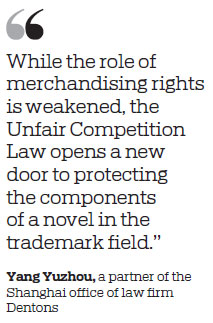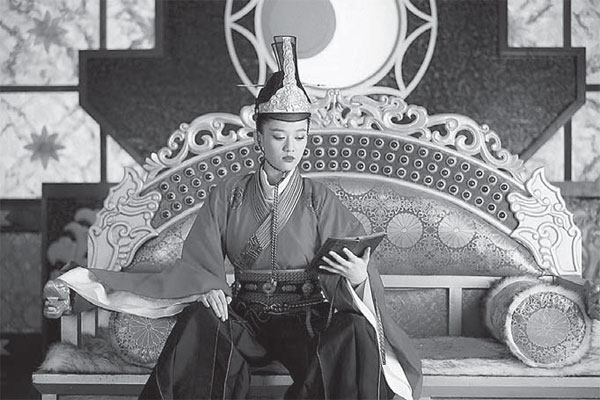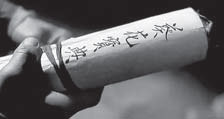Prior rights at center of trademark dispute
Companies clash over usage of the name of fictional kung fu training manual in a novel
A recent legal case has triggered a flurry of discussion among industry experts on whether the name of a fictional book in a novel can be protected as a prior right, and thus be prevented from being registered by another party as a trademark.
The case's ruling also indicates that judges have changed their position on merchandising rights for fictitious works.
Kuihua Baodian, or Sunflower Manual, is a specialized martial arts manuscript in the kung fu novel The Smiling Proud Wanderer, created by late renowned Hong Kong writer Louis Cha Leung-yung in the 1960s. Cha is commonly known by his pen name, Jin Yong, among Chinese readers.
|
A still of TV series The Smiling Proud Wanderer, adapted from the identically named kung fu novel. The Hong Kong novel has been adapted into various versions of TV series, films and video games. Provided to China Daily |
In the novel, the manual stirs up the excitement of kung fu students who seek to find it in order to gain knowledge.
Just like its popularity in the fantasy world, the name of the fictional book, Kuihua Baodian, has become something to scramble for in reality - it was the focus of a trademark dispute between two Chinese video game companies - Beijing Perfect World Digital Technology and UQee.
UQee, based in Shanghai, used the name of the manual to apply for a trademark on the Chinese mainland in 2012, which it was granted about a year later.
In 2015, Perfect World disputed the trademark and applied with the then Trademark Review and Adjudication Board to invalidate it. The government agency in charge of trademark review at the time has been incorporated into the China National Intellectual Property Administration after the reconfiguration of the central government's departments last year.
Two software companies affiliated with Perfect World, headquartered in Beijing, gained authorization to adapt the novel, as well as its components, to game software for its exclusive development, distribution and operation on the Chinese mainland.
They were also authorized to initiate legal proceedings against infringements and unfair competition related to the novel in their own name, China Intellectual Property News reported.
The board granted an invalidation in March 2017, saying that Cha owns the rights of merchandising the name of the kung fu manual he created in his novel.
|
A kung fu manuscript named Kuihua Baodian, or Sunflower Manual, created in the novel is something that practitioners of martial arts scramble for in the book. Provided to China Daily |
The registered trademark is exactly the same as the name of the manual and it is used in the service sectors, including online games and entertainment, in which adaptations of kung fu novels are commonly involved, the board said.
The registration is inclined to mislead the relevant public into believing that the trademarked services have connections with Cha or have gained authorization from him, which will take advantage of the commercial value and business opportunities stemming from the kung fu manual and thus damage its merchandising rights, the board noted.
As a result, UQee filed a complaint against the board with the Beijing Intellectual Property Court, seeking to regain the trademark, with Perfect World involved as a third party in the case.
The court recognized the merchandising right, which derives from the right of publicity under the legal framework of the United States.
According to the World Intellectual Property Organization, the right of publicity "recognizes that a person's image has economic value that is presumed to be the result of the person's own effort and it gives to each person the right to exploit their own image".
Yet the bench was divided on the case.
The minority opinion agreed with the board. It said Kuihua Baodian, as the special name of the manual in the novel, enjoys a good reputation and has a stable association with Cha and his novel The Smiling Proud Wanderer, so the trademark violates the writer's prior rights.
The majority opinion said that the right of merchandising can be applied to names of well-known copyrighted novels and their characters, according to a regulation concerning trademark cases that the Supreme People's Court introduced in 2017.
Providing protection to characters is to curb trademark squatting and maintain the filing environment, yet it lacks direct legal grounds, so there are higher requirements for their reputation and connection with writers and novels, the judges said.
A court needs to be cautious about its decision on whether a fictional book's name in a novel can be protected within the range of the merchandising rights, they noted.
The application is possible, only if such a name's reputation reaches or exceeds that of characters and without other factors blocking the stable connections between the name and the writer, they added.
In this case, with its rocketing fame after a series of films, television series and video game adaptations, Kuihua Baodian has evolved into a popular expression and can refer to a plan or manual to accomplish a given task or job, they said, adding that the change has blocked the stable association with Cha and the novel.

Under such circumstances, protecting a fictional book's name that cannot be copyrighted would damage the public's legitimate expectations of law and restrict their freedom of expression, according to the deciding opinion.
Thus the court revoked the board's decision and ordered it to re-adjudicate on the dispute.
The board and Perfect World filed an appeal with the Beijing High People's Court, which made its ruling on the case at the end of February.
The appeal judges upheld the verdict by the IP court yet gave different reasons.
Unless otherwise stipulated by legislation, judges should not create an exclusive right in an individual case, the appeal judges said.
Under the existing Chinese legal framework, no provision can be found, stipulating that a fictional book's name created in a novel can be protected as a prior right, either in the form of a kung fu manual or others. Thus providing direct protection to such a book component lacks legal grounds, they said.
At the same time, the high court noted that the board ruled the trademark in question violated the Trademark Law from the perspective of merchandising rights, yet it didn't rule if the registration had breached Perfect World's prior rights.
Combining the evidence provided by the company, the board needs to reconsider if the trademark's registration and use breach commonly accepted business ethics and constitute unfair competition banned by law, the judges said.
Yang Yuzhou, a partner of the Shanghai office of law firm Dentons, said in an article online that the court ruling reflects judges' prudence in recognizing the merchandising rights.
Definition of the rights remains vague, since being introduced from Japanese law to China in the 1980s, Yang said.
The Beijing high court had made it clear earlier that merchandising rights could be protected as a prior interest in previous appeal cases concerning Kung Fu Panda and fictional British secret service agent James Bond.
Yet the logic has changed and the judges have turned their attention to unfair competition - if a trademark registration constitutes unfair competition, it will breach the Trademark Law, Yang said.
"While the role of merchandising rights is weakened, the Unfair Competition Law opens a new door to protecting the components of a novel in the trademark field."
(China Daily 03/28/2019 page17)
















